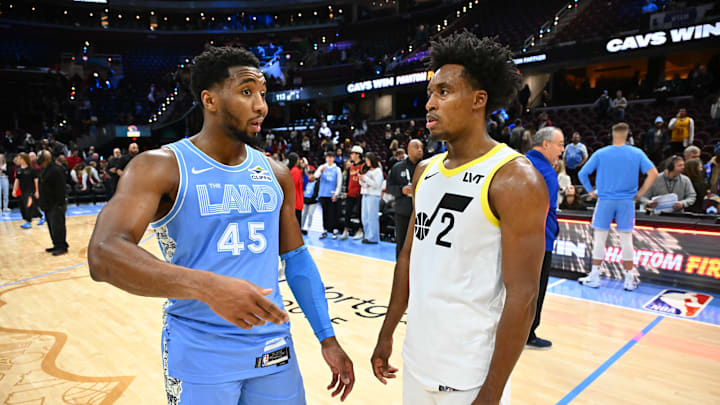As the clock hit one minute to go in the Cleveland Cavaliers' Monday night home matchup with the Utah Jazz, the Cavs were up just five points. The Utah Jazz had been hot from 3-point range and kept the game close all night, and Darius Garland had the ball hoping to bring the game home. A score on that possession all but sealed the deal; a miss, and the Jazz still had life.
He was patient, probing the defense as he dribbled into the paint and curled around the free throw line, forcing multiple defenders to keep an eye on him. One such defender was Collin Sexton, who once shared a backcourt with Garland in Cleveland before he was traded away as a part of the Donovan Mitchell trade package.
As Sexton peered at his onetime teammate, Georges Niang, the man he was guarding on the perimeter, snuck right behind him along the baseline. Garland kept his eyes on where Niang was supposed to be and started the passing motion, causing Sexton's head to swivel to the corner to locate Niang. But at the same time, Garland was dishing a no-look bounce pass right to the cutting Niang, who scored the game-clinching layup.
Collin Sexton is a good NBA player
The Utah Jazz have a lack of reliable players on their roster as they look to develop a new wave of young prospects. First and second-year players like Keyontae George and Isaiah Collier and Brice Sensabaugh and Cody Williams are all engaged in the struggle to find their footing in the NBA.
That's what makes Collin Sexton such an intriguing and useful player to the Jazz. Now in his seventh season, Sexton has discovered how to score in the NBA. He is having perhaps the best scoring season of his career, needing just 12.4 shots per game to score 17.1 points. It's certainly his most efficient, as he is hitting a career-best 43.4 percent from deep.
The Cleveland Cavaliers have seen that level of scoring ability up close; he once averaged 24.3 points per game in just his third season in the league. When you combine that scoring ability with the intensity he brings to the court, you get a player that seems like the perfect fit for a team's long-term plans.
Yet the Cavaliers were unwilling to sign Sexton to a lucrative second contract, instead going into restricted free agency without a deal and ultimately trading him to the Utah Jazz. They chose Darius Garland over Sexton and were not even interested in trying to pair the two in the backcourt long-term.
Why was that? Well, it's due to something that the Utah Jazz are slowly coming to realize themselves: Collin Sexton passes the eye test, but ultimately he is too small to be a wing, too poor of a passer to be a point guard, and too inconsistent on defense to be a winning player.
The Jazz are realizing Collin Sexton's limitations
That was on full display in Monday night's game. Not only did Sexton blow the defensive assignment on that game-sealing basket, he was unable to slow the Cavaliers' guards all night. Dononvan Mitchell scored 22 points, Garland 23, and Sam Merrill got loose for six 3-pointers and 20 points. For the night, Sexton played 36 minutes and was a -13 on the night. In the team's other 12 minutes, the Jazz outscored the Cavs.
Sexton was forced to play point guard in the absence of Keyontae George, and due to his sheer volume of touches he did rack up five assists. Those came alongside four turnovers, however, which is always the Collin Sexton experience. For the season he is averaging 3.4 assists but also 2.7 turnovers per game. For his career, despite playing the majority of his minutes as the primary ball-handler, he averages just 3.6 assists per game.
Darius Garland, on the other hand, racked up eight assists on the night, passing Terrell Brandon for fourth-place all-time in Cleveland Cavaliers history. He scored 23 points on just 14 shots, while Sexton needed 22 shots to score his 24 points. That's obviously one game, but it was a perfect microcosm of the problems inherent in Sexton the player.
Generously listed at 6'3", Sexton doesn't have the size, length or defensive chops to defend wings. Yet at the same time, he doesn't have th epassing vision to be a point guard in an effective offense. Can he be a score-first bench weapon? Perhaps, but that type of player isn't worth a major contract.
Because of those limitations, Sexton cannot scale up next to other stars very well. He is a good player who is bad in all of the wrong places to excel in the NBA. The Cavaliers saw it and moved on before they were pot-committed. The Jazz are now coming to the same realization, but they may be stuck with the Collin Sexton experience for years to come.
